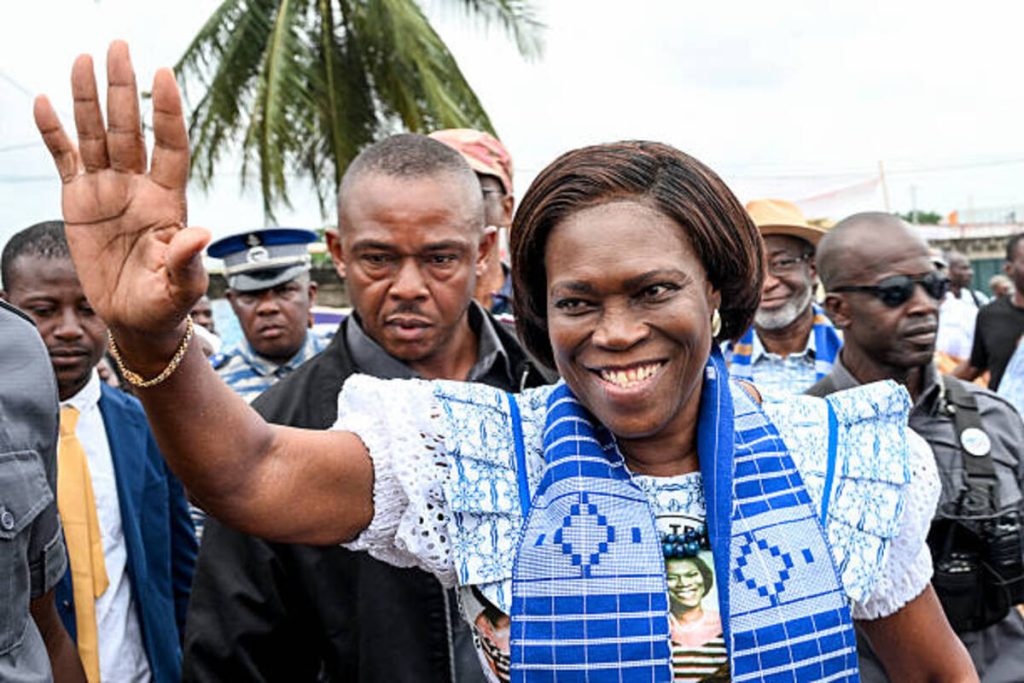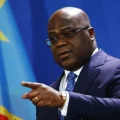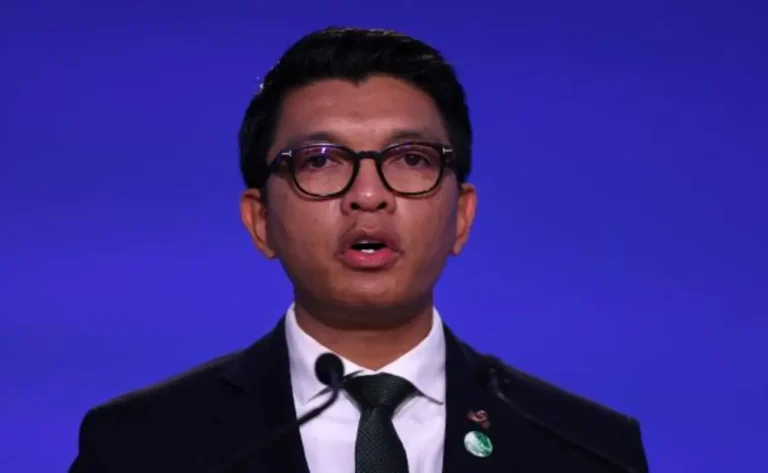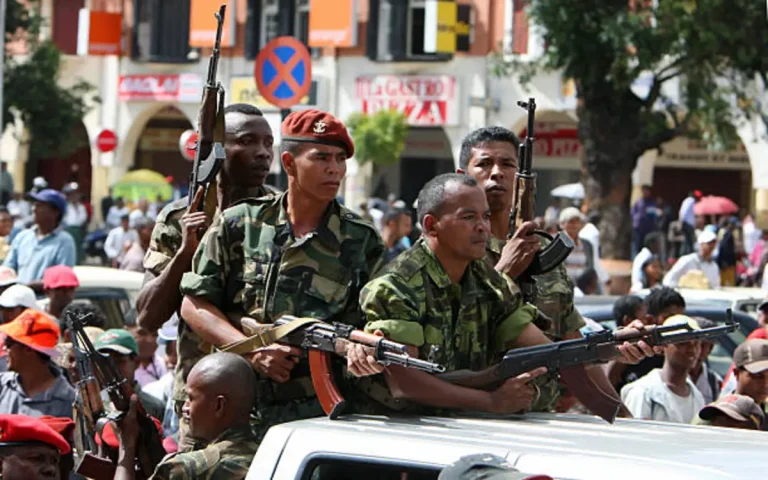
Simone Ehivet Gbagbo, former First Lady and MGC president, greets supporters during an annual rally in Youpougon, Abidjan, on July 5, 2025. Sia Kambou/AFP
ABIDJAN, Oct 22 (Epicstorian News) — Simone Ehivet Gbagbo, a former first lady of Ivory Coast and influential political figure, is contesting the October 2025 presidential election, marking her first bid for the presidency since her release from prison in 2018.
Her return to national politics signifies a major turning point in Ivorian democracy, which has been shaped by long-standing rivalries between current President Alassane Ouattara, former President Laurent Gbagbo, and other opposition figures.
Known widely as the “Iron Lady,” Simone Gbagbo now leads the Movement of Capable Generations (MGC), a political party she founded in 2022.
The party’s emergence followed the declining influence of traditional opposition movements, many of which were weakened by post-conflict divisions and leadership disputes.
Her candidacy is legally recognized by the Independent Electoral Commission, which published a list of approved contenders earlier this month. Analysts view her campaign as both a personal reinvention and a political test for a society still recovering from years of civil strife.
How Has Simone Gbagbo Shaped Ivorian Politics?
Simone Gbagbo’s role in Ivory Coast’s political transformation spans nearly five decades.
Her activism began in the 1970s as a trade union leader at the University of Abidjan, where she advocated for workers’ rights under President Félix Houphouët-Boigny’s one-party system.
During the 1980s, she co-founded the Ivorian Popular Front (FPI) alongside Laurent Gbagbo and other pro-democracy intellectuals, marking a pivotal moment in Ivory Coast’s transition from a single-party state to a pluralistic political system.
When Laurent Gbagbo became president in 2000, Simone served as a member of parliament and later as an influential adviser. She was known for her strategic influence within the ruling circle, particularly during periods of national division and armed rebellion between 2002 and 2007.
What Events Led to Simone Gbagbo’s Fall From Power?
The 2010–2011 post-election crisis marked the lowest point of Simone Gbagbo’s career.
Following disputed presidential results in 2010, then-incumbent Laurent Gbagbo refused to concede defeat to rival candidate Alassane Ouattara.
The confrontation led to widespread violence, causing an estimated 3,000 deaths according to the International Criminal Court (ICC) and the United Nations.
Simone Gbagbo was arrested alongside her husband in April 2011 when pro-Ouattara forces stormed their residence in Abidjan.
The International Criminal Court issued a warrant for her arrest for alleged crimes against humanity, but the Ivorian government chose to try her domestically. In 2015, a national court convicted her of endangering state security and sentenced her to 20 years in prison.
Why Was Simone Gbagbo Granted Amnesty in 2018?
In August 2018, President Ouattara granted amnesty to Simone Gbagbo and around 800 political detainees as part of a national reconciliation initiative.
The presidential decree aimed to reduce political tensions and foster peace ahead of upcoming elections. Her release was also interpreted as a gesture to reestablish public trust after years of polarized governance.
International observers, including ECOWAS and the African Union, noted the move as a symbolic step toward national healing, though critics questioned whether it adequately addressed accountability for past violence.
How Does Simone Gbagbo’s New Party Define Its Agenda?
Simone Gbagbo founded the Movement of Capable Generations (MGC) to promote what she calls “a new political conscience for national restoration.”
The MGC identifies itself as a social democratic party advocating equitable development, women’s inclusion, and transparent governance.
Central to her campaign is the idea of “true monetary autonomy” — a call for economic sovereignty by reducing dependency on the euro-pegged CFA franc.
She argues that a transition toward a regional currency could empower West African economies to shape independent fiscal policies.
Economists have debated the practicality of this approach, with the West African Monetary Institute confirming ongoing discussions on the adoption of the ECO, a proposed regional currency.
How Is Simone Gbagbo Building Her Political Alliance?
Simone Gbagbo’s campaign has gained traction through alliances with grassroots movements and political actors formerly loyal to the FPI.
In September 2025, she received open endorsement from Charles Blé Goudé, a former youth minister acquitted by the ICC in 2019.
This endorsement reunited former allies from the Gbagbo political era and bolstered her image among voters seeking unity within the fragmented opposition.
Analyst Arthur Banga, from Félix Houphouët-Boigny University, told Ivorian media that her coalition “represents a renewed opposition identity capable of shaping post-2025 politics.”
What Role Does Reconciliation Play in Her Campaign?
National reconciliation remains the core of Simone Gbagbo’s presidential message.
Her campaign platform includes a proposal for a general amnesty law that would grant freedom to political prisoners and enable exiled citizens to return.
She has emphasized that reconciliation must include “justice, forgiveness, and truth,” positioning her as a moral alternative in a political environment often associated with retribution.
Can Simone Gbagbo Challenge Ouattara’s Dominance?
President Alassane Ouattara, who has governed since 2011, remains a dominant figure in Ivorian politics.
His administration’s supporters highlight achievements in economic stability, infrastructure development, and international relations.
However, critics argue that political freedoms have narrowed under his rule, pointing to disqualifications of opposition figures, including Laurent Gbagbo and Tidjane Thiam, by the electoral commission.
Simone Gbagbo’s entry into the 2025 race presents the most recognized female candidacy in Ivorian political history, offering voters an alternative to the prevailing political establishment.
The Independent Electoral Commission confirms her eligibility, and campaign rallies have drawn significant attendance across Abidjan, Bouaké, and Yamoussoukro.
What Could Simone Gbagbo’s Legacy Mean for Ivory Coast?
Whether or not Simone Gbagbo wins the 2025 election, analysts believe her candidacy has already redefined the conversation about women in Ivorian leadership.
She represents continuity between the nation’s historical struggles and its modern democratic aspirations.
Related: Madagascar President Rajoelina Impeached As Soldiers Seize Power After Weeks Of Political Unrest
Political experts predict that her campaign may lay groundwork for the next generation of female leaders and cement her reputation as a resilient survivor in one of Africa’s most competitive political arenas.
Historian Banga noted, “She may not reclaim the presidency, but her influence will shape who leads Ivory Coast after 2030.”





